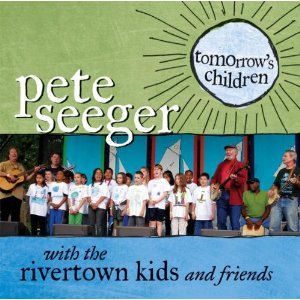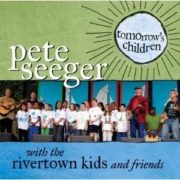PETE SEEGER – TOMORROW’S CHILDREN
ARTIST: PETE SEEGER WITH THE RIVERTOWN KIDS AND FRIENDS
TITLE: TOMORROW’S CHILDREN:
PETE SEEGER WITH THE RIVERTOWN KIDS AND FRIENDS
LABEL: APPLESEED RECORDS:
(APR CD 1123)
RELEASE DATE: 2010
 When Pete Seeger was charged with Contempt of Congress for not answering House Un-American Activities Committee (HUAC)’s questions on August 18, 1955, he began a long sojourn as an underground artist, after having headed the most successful pop folk quartet in music history just five years before. That would be The Weavers, which crashed and burned less than one year after soaring to the top of the hit parade in 1950, with their two-sided hit record of Tzena Tzena Tzena and Goodnight Irene. They were blacklisted before the year was out, and had two years worth of bookings cancelled on them overnight.
When Pete Seeger was charged with Contempt of Congress for not answering House Un-American Activities Committee (HUAC)’s questions on August 18, 1955, he began a long sojourn as an underground artist, after having headed the most successful pop folk quartet in music history just five years before. That would be The Weavers, which crashed and burned less than one year after soaring to the top of the hit parade in 1950, with their two-sided hit record of Tzena Tzena Tzena and Goodnight Irene. They were blacklisted before the year was out, and had two years worth of bookings cancelled on them overnight.
Pete had already started to take concert bookings as a solo artist by the time he was officially subpoenaed by HUAC, and after they got through with him it looked for a time as though his concert career would be one of the more significant casualties of the red scare in the McCarthy era. I described this era and Pete’s role in it, including his 1st Amendment defense, eventual conviction in 1961 and subsequent reversal by the US Supreme Court in some detail in a previous column, Pete Seeger’s Finest Hour, so no need to rehearse it here.
The silver lining in this cloud of fear and witch hunts was that Pete was forced to leave the high end concert market and find work wherever he could, which turned out for a number of years to be doing children’s concerts at schools and summer camps. These venues were beneath the radar of the FBI and Red Channels, their corporate stooges in the entertainment industry, which figured that this notoriously subversive artist could not cause too much trouble singing playtime songs for kids.
Little did they know; as he described it himself in a broadside based on an actual folk song written by a group of Christian students, Poisoning the Students’ Minds, Pete spent the late fifties sowing seeds of folk music and its history of championing people’s struggles-from the Underground Railroad to the Labor Movement-in schools across America, creating the very audience that would quickly burgeon into the university folk scare of the 1960s. By the time the Kingston Trio, Bob Dylan and Joan Baez came along they-and a hundred others in the Cambridge and Greenwich Village folk scene-were the beneficiaries of Pete’s lonely battle for survival and recognition against a sea of troubles.
I should know; I was one of those kids who heard “a Pete Seeger children’s concert” when I was growing up, and fell in love with the banjo and songs that reflected a wide swath of American history, before I knew much about that history from books. Pete has sung for children ever since, in many arenas, from Sesame Street to African villages during his world tour in 1963. The most moving picture of him in performance to my mind was taken by his son Dan Seeger, sitting in a circle with a group of wide-eyed African children, enchanted by his banjo, songs and stories, including Wimoweh, a South African cante-fable which he adapted from a book his father Charles Seeger had given to him many years before.
There may have been a pied piper with a surer touch for inspiring children to sing and listen than Pete Seeger, but I have never encountered one. Several generations of children’s artists owe their careers to Pete, for whom necessity was the mother of countless inventions in how to hold a young audience spellbound. No one has so thoroughly integrated music and storytelling into a unified art form as Pete, with extended pieces like Abiyoyo, Wimoweh, the Foolish Frog and the Cumberland Mountain Bear Chase, a banjo story-song he adapted from an Uncle Dave Macon song the Cumberland Mountain Deer Chase. That was the story song that made me pick up a five-string banjo and try to figure out how he could make five strings sound like a hoot owl, a bugle, a hound dog and a bounding bear all in the same song. Astonishing is the only word I can think of to describe it.
At the age of 91, Pete has slowed down somewhat, but he hasn’t lost his touch with children. Last year he got drawn into participating in a local elementary school project near his home in Beacon, New York, after one of the teachers invited a colleague from Pete’s Hudson River Sloop Clearwater to come in and teach them some of the history of their forty year effort to clean up the Hudson River, which at the time Pete started in 1969 was the most polluted waterway in North America. When Pete began to “Think globally, act locally,” he wasn’t kidding.
Like he always has, Pete got involved-first with one class of kids, then the rest of the school, then with this recording of new songs to celebrate the environment and an ongoing struggle to save it, out of which a children’s chorus evolved, which they have dubbed “The Rivertown Kids.” Pete is surrounded on this recording with several generations of performers/songwriters/teachers and schoolchildren who have lent their voices to an inspiring document in testimony to the power of song to bridge our differences and show us a way forward through a cacophony of media spinmeisters always seeking to tear us apart.
Pete’s way is simple, and has not changed much in seventy years as a public figure: music can bring us together, and inspire us to be better citizens and conscientious custodians of this one planet we all share. His native optimism, his gentle affirmation of youthful intelligence (once demonstrated by championing the then new topical songs of Phil Ochs, Tom Paxton, Malvina Reynolds and Bob Dylan) is now leant to the service of these classroom troubadours, providing banjo and 12-string accompaniment to songs of his younger colleagues, and singing lead on a number of newer songs that he has helped once again to find an audience for.
The album is book-ended by one of my favorite of his songs, Quite Early Morning, with these words to live by:
And when these fingers can strum no longer
give the old banjo to young ones stronger
And when these fingers can strum no longer
Give the old banjo to young ones stronger.
While I approve the sentiment, I am also inclined to say, “Not so fast, children; before you pick up that old banjo, listen once again to this master at work-for as soon as you put on this CD and hit the play button, you know you are listening not just to a banjo, but to Pete Seeger’s banjo. This simple, beautiful melody that I have heard a hundred times before has somehow a new haunting quality mixed in with its message of hope; maybe it’s the sense of time closing in, of feeling that this performance may be the one with which to say farewell. And yet, by the time you reach the end of this generous 19-song CD, you now hear the kids singing it,
Though all this world of joy and sorrow
We still may have singing tomorrows
Through all this world of joy and sorrow
We still may have singing tomorrows.”
And, like everything else Pete sings, and has gotten us to sing, you can’t help believe it. His belief in those singing tomorrows, in spite of global warming, two un-winnable wars, religious intolerance abroad and a resurgent racial divide at home, is enough to keep you going, and to take his advice and find some children to sing with. Pete may not be able to keep them young, but they have certainly helped to keep him young.
You may want to share with them some of the unheralded gems on this record: a lesson in the maddening eccentricities of the English language, composed by Josh White, Jr. from the book Crazy English, by Professor Richard Lederer of UCLA, called English Is Cuh-ray-zee; a song Pete wrote for the man he taught We Shall Overcome to-Martin Luther King-called Take It From Dr. King, celebrating non-violence to a captivating calypso beat which David Letterman’s entire studio audience sang along with when Pete graced his stage last year; a brand new song Solartopia with Pete’s old-sounding music adapted from the African-American spiritual Joshua Fit the Battle of Jericho, which takes Sir Thomas More’s concept one step further (sung with Dar Williams), the title song by poet Walter Lowenfels (who wrote Wasn’t That a Time with Lee Hayes) and Pete, and some new verses written by Pete’s wife of sixty-one years Toshi Seeger to his classic song Turn, Turn, Turn.
And you may be moved practically to tears as I was by his previously untold tale of how he came to write Turn, Turn, Turn. Pete got a letter from his publisher asking him if he could stop writing protest songs long enough to give him something he could actually sell-something like Goodnight Irene. Pete got angry and wrote him back that he only knew how to write one kind of song, and if he didn’t like it he should find himself another songwriter. But he also got mad enough to finish one more song he had been tinkering with, based on some verses from Ecclesiastes, which he stuffed into the envelope with his-or so he thought-farewell letter to his publisher. The publisher took one look at it, sent it off to this folk rock band in LA-The Byrds-and wrote back to Pete to say, “That’s exactly the kind of song I was looking for!”
What brought a lump to my throat was the thought of Pete standing there in his log cabin, reading a letter from his publisher telling him that songs like Waist Deep In the Big Muddy weren’t good enough-and, his head bloody but unbowed-having the courage and presence of mind to write back, “I only know how to write one kind of song.”
That “one kind of song” is the truth, and Pete Seeger has been singing and writing it without apology for going on seventy years. How lucky we have been, and how fortunate we are, to have this national treasure still among us, and passing on his musicianship, his sense of the past, engagement with the present, and hope for the future to yet another new generation of tomorrow’s children.
Pete Seeger’s new album, Tomorrow’s Children may be ordered from Appleseed Records at info@appleseedmusic.com 610-701-5755; P.O. Box 2593 West Chester, PA 19380.
Ross Altman may be reached at greygoosemusic@aol.com His Ph.D. is in Modern Literature. To hear Ross sing Pete’s classic antiwar song Waist Deep In the Big Muddy, you may log onto the Pacifica Radio Archives series From the Vault, and write either the catalog number FTV 219 in the search bar, or the title, The Ten Greatest Protest Songs of the 20th Century, originally recorded and broadcast live at the Autry Museum of Western Heritage on September 26, 1999. The CD may also be purchased from Pacifica, 800 735-0230.













